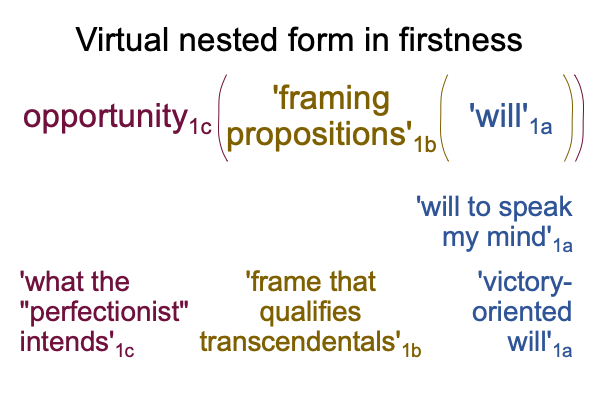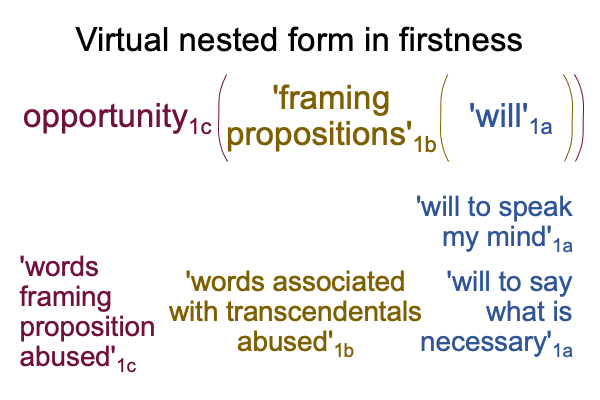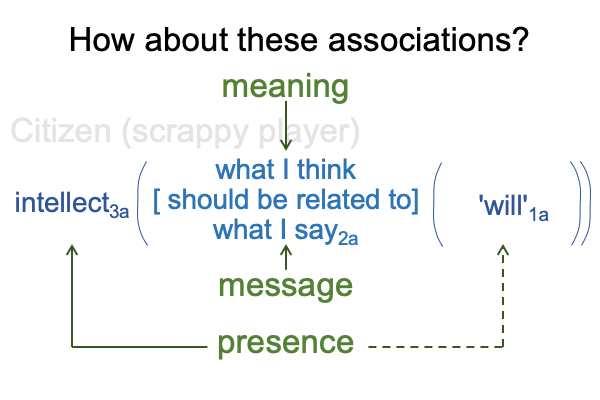0774 What does Plato… er… Socrates hold against the sophists?
Pieper suggests that insight may be gained by comparing the two words, “perfection” and “perfectionism”.
“Perfection” is a word that represents a whole or a completion. Perfection applies to things that have achieved what they were intended to be. For example, the perfection of an acorn is a full-grown oak tree. Applied to the topic at hand, I imagine that perfection also applies to the transcendentals, because they represent an end point for what I think2a and what I say2a.
0775 “Perfectionist” is a word that represents a person who fixates on perfection. But, that perfection is what the perfectionist intends the perfected object to be.
For example, the perfection of a debate is a decision2c in the normal context of refined reason3c, that exploits an opportunity1c, which is the potential of… well, let me not fill in those details.
Instead, let me point out that perfectionists (as well as sophists) love to qualify transcendentals. For example, logic defines truth. Seduction characterizes beauty. Gorgias looks noble. Prudence describes the behavior of sophisticated winners. “Temperance” is a word that characterizes everyone who agrees with my argument. Everyone else is “intemperate”.
0776 Does that sound like abuse of language?
Here is a picture of the virtual nested form in the category of firstness.

Debate over public policies takes place in a forum. The citizen level has two actors: citizens and sophists (representing whoever is paying them to argue). So, there are two wills.
0777 The citizen does not fully comprehend that the sophist establishes a situation that emerges from (and situates) policy debates. That situation starts as soon as the sophist frames propositions1b in such a manner as to support sophisticated values2b, which opens opportunities1c for public decisions2c.
Does this sophisticated process include the conditioning of transcendentals?
I suspect so.
0778 The meaning, presence and message underlying a spoken word1a that is supposed to represent a transcendentalmay be manipulated1b in such a fashion as to generate sophisticated values2b for any particular debate. This occurs within the situation level, as the proposition is framed1b as promoting sophisticated values2b, in the normal context of rhetorical debate3b. This is what sophists do. They tell the citizen what he wants to hear while satisfying the ambitions of those who are paying for his services.
Welcome to “our” democracy.
0779 The opportunity1c for a decision2c arises when the boiling of the crudities of spoken words2b is further refined by the evaporation of the water, the matrix of debate, thereby crystallizing the words of the decision2c itself. Reason3a,1a is refined3c in so far as the very terminology that goes into the decision2c abuses the words framing the proposition1b in favor of sophisticated values2b, because the implementation of a decision2a is not necessarily the perfection of the decision itself2c.
0780 You may ask yourself, “What the hell does that mean?”
Does it suggest that crystalline sugar refined from some unfortunate plant serves as a metaphor for whatever the hell that means?
Does it suggest that the abuse of language is, to the realm of possibility, what the abuse of power is to the realm of normal contexts?
0781 Does it suggest the following?

Yeah, that looks abusive.
0782 So, what does Plato have against the sophists?
Just as perfectionists2b spoil perfection2a, sophists ruin the spoken words2a that they weave into sophisticated valuations2b.
0783 Let me start with the perfection of spoken words.
Spoken words do two things. They convey reality. They facilitate common understanding.
But, what is “reality”? What is “understanding”?
0784 Reality is the perfection of a spoken word in so far as the word indicates or images its referent. Yes, spoken words are supposed to refer to a reality that can be pictured or pointed to. In effect, spoken words are supposed to accomplish what hand-talk (or sign language) performs effortlessly. Hand-talk words are holistic manual-brachial gestures that picture or point to their referents. Speech-alone talk cannot picture or point to anything. However, we (humans) seem to innately anticipate that it does.
0785 But, that does not mean it does.
So, let me put a pause on reality as the perfection of a spoken word.
What about understanding?
0786 Understanding is the perfection of spoken words in so far as understanding is the completion of a category-based nested form. I may encounter an actuality. But, I do not understand until I can frame the encountered actuality2 with a normal context3 and potential1.
0787 On top of that, I claim that there are three characteristics that go into a category-based nested form that allows me to define spoken words.
Meaning associates to what I think. Meaning also touches base with reality or reference.
Message associates to what I say. Message also touches base with my motivations, in regards to reality or reference.
So, meaning should be related to message.
Here, meaning is like matter. Message is like form.
0789 Presence associates to me. My intellect3a contextualizes my will1a.
But, in conversation, there are other intellects3a and wills1a, so the normal context and potential of understanding is ambiguous. What about “our intellect3a” and “our will1a“? Does mean that there are others who are influencing me? So, does a perfection of understanding occur when I surrender “my” intellect3a and “my” will1a to the reasoning3a,1a of others?

0790 These are interesting questions.
However, I need to put a pause on understanding as the perfection of a spoken word.
